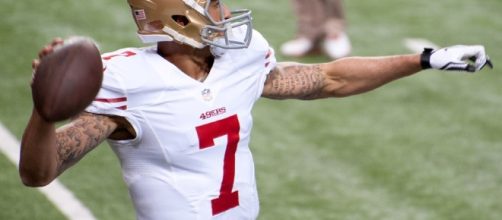Sports are being used to make cultural and political commentary now more than ever before. NFL players taking a knee or locking arms during the national anthem in the United States is quickly becoming a First Amendment issue. Some see free expression and speech under attack.
The more President Donald Trump denounces protesting football players, the more the attention of the protest moves from social justice to anti-Trump. When Jemele Hill, a black woman, called the president a “white supremacist” in a tweet, she was suspended for two weeks. A few years ago, a white commentator, Curt Schilling, was fired after posting a statement opposing the idea of transgender people using bathrooms that did not match their birth gender.
Both commentators were employed by ESPN. The disparity in their punishments has raised questions about free speech and culture at the Disney-owned sports network.
Donald Trump is a white supremacist who has largely surrounded himself w/ other white supremacists.
— Jemele Hill (@jemelehill) September 11, 2017
NFL
The NFL controversy arose in 2016 when then-San Francisco quarterback Colin Kaepernick took a knee during the national anthem. He said he was protesting social injustice, particularly police shooting unarmed black men. A few players joined him. Hundreds, including several owners, joined the protest this season after Trump began tweeting nasty remarks about players demonstrating.
The NFL is facing a backlash.
Television ratings and attendance are down. CBS, NBC, ESPN, and Fox pay about $5 billion per year to the league for coverage rights. That deal expires in 2020. Much of that money goes to ever increasing player contracts. A Gallup poll released Oct. 13 shows that the NFL dropped 10 percent in popularity among U.S. adults between 2012 and 2017. The player protests are one of several reasons for the decline.
'Let me work'
Kaepernick accuses NFL owners of not signing him since Kaepernick walked out of his contract with the 49ers earlier this year. The quarterback’s high-priced lawyer says it is all about politics.
However, the 49ers were 1-10 with Kaepernick at the helm in 2016. His ESPN QB rating—a measures of quarterback performance that incorporates all of a quarterback’s contributions to winning, including how he impacts the game on passes, rushes, turnovers and penalties—was 49.5.
The highest in the league was 79.6; the lowest was 37.5. Kaepernick’s pass rating was 90.7, No. 16 among 30 qualifiers. Passer ratings are calculated using a player's passing attempts, completions, yards, touchdowns, and interceptions.
If the NFL has to employ the second round draft pick from 2011, what about the second player chosen in the 2012 draft? Like Kaepernick, Robert Griffin III was a great college athlete whose success fell short of expectations. Must RG III be put on a roster?


